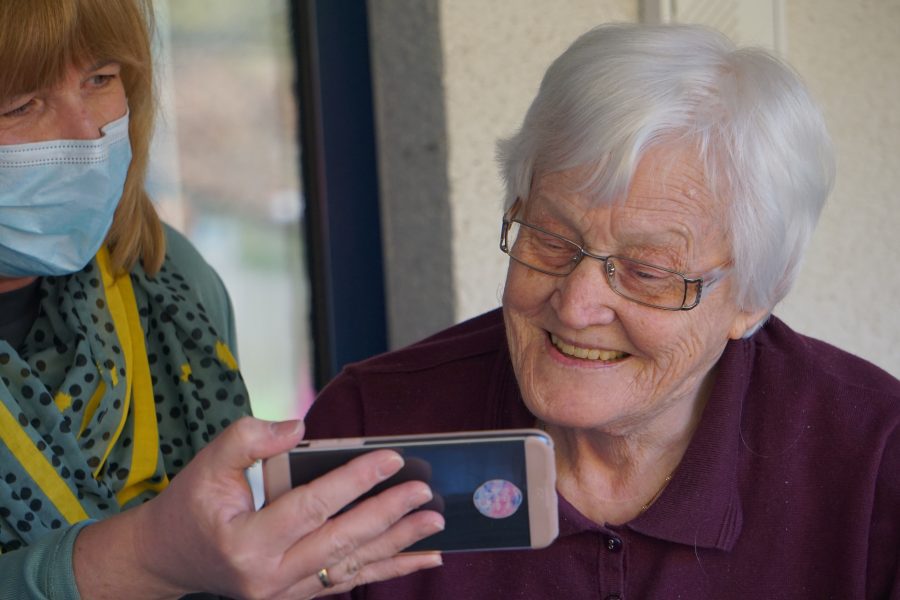Pursuing a career in the medical field provides you with many opportunities to help those in need, create a flexible schedule, and earn a steady income. As you gauge which medical profession will be the best fit for you and whether or not you are interested in travel healthcare or staying close to home, start by writing down a list that includes both your skills and strengths to do a comparison.
If you’re a good communicator who likes connecting with patients, making a positive difference, and being part of a dynamic team, a career as a Certified Nursing Assistant (CNA) might be the perfect fit for you.
This guide will explore how to become a certified nurse assistant and detail the requirements, roles, and responsibilities of this profession to help you begin your nursing career. You may also gain some insight on the distinctions of a medical assistant vs. nurse and what stepping stones are needed to develop your career as a CNA.
What is a CNA?
A Certified Nursing Assistant is an integral part of the healthcare team, carrying out much of the day-to-day physical work involved in caring for a medical patient. From gathering supplies to feeding patients, CNAs perform myriad important duties assigned to them by a registered professional nurse.1
Working directly with a healthcare professional, which could include doctors and nurses, CNAs may perform any of the following:
- Gathering and stocking supplies
- Answering patient call lights
- Checking and recording vital signs like blood pressure, heart rate, and temperature
- Feeding patients
- Documenting patient data such as liquid or food intake
- Grooming, bathing, and moving patients
- Cleaning patient rooms and bed-linens
- Assisting with medical procedures as needed
Some of the instruments and equipment that a CNA might utilize daily include:
- Thermometers
- Pulse oximeters
- Swabs
- Bedpans
- Wheelchairs, walkers, and support devices
- Blood pressure cuffs
- Bandages, wraps, splints, and braces
As a CNA, you’ll have the opportunity to work in a variety of diverse environments, including:
- Clinics
- Hospitals
- Acute care centers
- Residential care centers
- Skilled nursing facilities
- Rehabilitation centers
- Long term care facility
The Path Toward Becoming a CNA
Knowing how to become a certified nursing assistant starts with earning an education. Generally, the minimum training requirement for a CNA is a high school diploma or a General Education Degree (GED).
Step 1: CNA Training Program
Once you have your high school diploma or GED in hand, you’ll then need to enroll in a state-accredited CNA training program, which can take anywhere from 6 weeks to 6 months to complete, depending on the intensity of the workload. Classes that are typically offered in a CNA-training program are:
- Introductory nursing
- Anatomy
- Nutritional care
- Medication care
- Taking vital signs
- Infection control
- Safety procedures
- Emergency procedures
- Disease management
CNA-training programs are available at a wide variety of private and public educational institutions from vocational schools, to a university, or community college type setting. When becoming a cna student and choosing a program, it may be beneficial to explore the following questions:
- Is the program accredited in your state?
- What CNA classes are offered?
- How are the courses offered?
- Remote
- In-person
- Classroom
- Hands-on
- What is the time commitment?
- Do I need to complete any clinical hours?
- What is the cost?
- Does the institution offer any additional benefits such as job placement?
- Does the institution offer additional certifications like HIPAA, BBP, or CPR?
- Are there stipends, scholarships, or other financial aid programs available?
Step 2: CNA Certification
In many states, a CNA must not only complete an accredited training program but must also be certified to earn their official CNA title. The certification process can vary from state to state, but usually, the following are required:
- Two-part competency certification exam
- Practical exam (usually multiple choice)
- Manual skills test
- In-person clinical training
- Background check and documentation of identity
To find out the exact requirements of where you live or want to practice, start by looking at your state’s Department of Public Health website. For example, if you are looking to practice in California, you would want to research the state exam requirements for the California Department of Public Health. Another resource that can help you get started is the National Association of Health Care Assistants (NAHCA).2
CNA to RN, and Everything in Between
While working as a CNA is rewarding in its own right, many CNAs use the job as a stepping stone to become a registered nurse (RN) or another medical professional. Understanding how to write your nursing credentials and the distinctions between CNAs, RNs, LPNs, and PAs will help you visualize the career trajectory you might want to take:
- Certified Nursing Assistant (CNA) – As you now know, this is the entry level for the nursing profession. Because the time and cost to achieve your CNA license is relatively low, many CNAs use the experience to decide if they want to pursue further education in the nursing field. While some of the duties involved in a CNA job might seem tricky at first (such as cleaning bedpans and providing wound care), these are skills that prepare you for other duties within the healthcare field.
- Licensed Practical Nurse (LPN) – An LPN (also called a Licensed Vocational Nurse (LVN) in some states) spends one year in a training program studying biology, pharmacology, and nursing before they can begin their licensure procedure. They must also complete supervised clinical experiences. Due to this enhanced level of training and skill, they are generally better paid than CNAs and their scope of duties is somewhat broader.3 However, like a CNA, an LPN reports to a supervisory registered nurse.
- Registered Nurse (RN) – Often referred to as the backbone of the healthcare system, Registered Nurses (RNs) are present in almost every aspect of medicine. The duties of an RN range from the mundane to the thrilling:
- Managing all aspects of patient care
- Readying patients for procedures
- Providing various types of therapy
- Setting up care plans
- Monitoring equipment
- Using advanced instruments
- Administering medicine
A nursing program can be offered at the associate (ADN) and bachelor (BSN) level, although each state has its own training and licensing minimum requirements for RNs.
Many RNs further choose to specialize within a particular field by getting a Master’s or Doctoral level degree, such as:
- Advanced Practice Registered Nurse (APRN)
- Certified Nurse Midwife
- Clinical Nurse Specialist
- Nurse Practitioner
You can even take your career a step further by looking into how to become a charge nurse after obtaining your RN certification.
- Physicians Assistant (PA) – A PA is not a nurse at all, but is another common member of the healthcare team. Focused on assisting a physician directly with the running of her practice, the PA’s work is more similar to that of a doctor in comparison to that of an RN. This difference in responsibility correlates to a higher level of education needed for licensure as a PA.
Host Healthcare Gets You There, Wherever There May Be
Once you are settled on a career path, look to Host Healthcare to help you find the best healthcare traveler jobs in the industry. Serving a wide variety of medical professionals looking for travel and excitement, we provide a range of high-paying assignments across the country.
Ranked the #1 Travel Healthcare Company in the US, we offer unparalleled experience to staff you on the right jobs. Apply, meet our knowledgeable and friendly recruiters, and find out why we are the industry leaders in travel healthcare staffing!
Reviewed by:
Hannah Wilson, BSN, RN, CCRN
Nursing Specialty: M/SICU, PreOp
I began my career as a new graduate nurse in an M/SICU where I ended up working for 5 years, one year of which I was a Team Leader. In January of 2020, I took my first travel nursing position in a Burn ICU. After 13 weeks there, I spent the next 14 months in a couple of Medical/COVID ICUs in CA where I primarily cared for COVID patients. After 7 years in the ICU, I needed a change and took a permanent position in PreOp in September of 2021, which is where I currently work. Being a nurse have given me so many opportunities and has taught me more than I ever thought it could – I can’t imagine doing anything else!
Sources:
- Detailed Guide for Nursing Assistants in CA. State of California, Employment Development Department, https://www.labormarketinfo.edd.ca.gov/OccGuides/detail.aspx?Soccode=311014&Geography=0601000000
- “The CNA Association.” National Association of Health Care Assistants, https://www.nahcacna.org/
- What is a Licensed Practical Nurse? WebMD, June 23, 2021, https://www.webmd.com/a-to-z-guides/what-is-licensed-practical-nurse
Registered Nurse
Years of Experience: 10
Specialties: PreOp & ICU: Medical/Surgical, Burn & Medical/COVID
Hannah stated her nursing career 10 years ago, going straight to the ICU as a new grad. She spent 6 years primarily in Medical/Surgical ICU before traveling with Host Healthcare from Jan 2020 – July 2021. During her time as a travel nurse, she worked in the Burn ICU and Medical/COVID ICU. She has since spent over 2 years in PreOp before recently stepping away from bedside.












